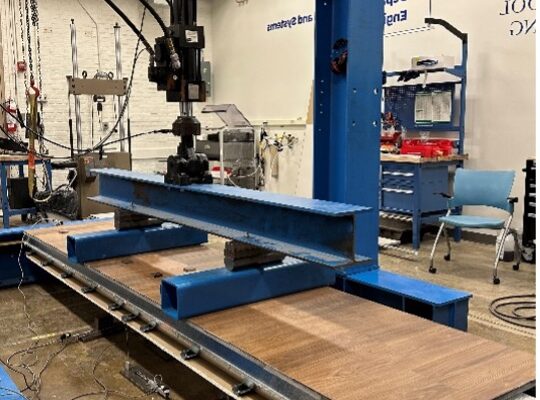A new workshop report on FastFloor R has been completed and posted by AISC. Over the past three years, the American Institute of Steel Construction (AISC) and the Steel Deck Institute (SDI) have partnered with researchers at Johns Hopkins University (JHU) to develop and evaluate a novel modular floor system known as FastFloor R (FF-R). This non-proprietary system, designed for low- to mid- rise steel-framed construction, aims to significantly reduce construction time and complexity by eliminating the need for cast-in-place concrete, using prefabricated modules comprised of steel deck and cementitious panels.
Through Phase 1 and Phase 2 of research, the team has completed a series of structural and serviceability evaluations. Phase 1 focused on proof-of-concept testing of composite floor modules, including flexural strength and stiffness characterization. Phase 2 expanded the program with refined end details, connection (pushout) testing, development of an alternative 6-inch deep deck configuration, and vibration performance assessment under a range of finish conditions. Analytical tools, including preliminary beam span tables, were developed in coordination with United States Gypsum (USG) and Simpson, Gumpertz and Heger (SGH) These results provide a strong technical foundation for system validation.
A one-day workshop held on December 3, 2024, brought together key stakeholders to evaluate the current state of development and identify the critical needs and opportunities ahead. Workshop discussions highlighted several key insights: serviceability criteria (vibration, acoustics, deflection) are likely to govern design acceptance; diaphragm behavior and fire resistance must be better quantified; and integration of FF-R into real-world construction will depend heavily on clear design tools, modularization strategies, and cost competitiveness. Attendees identified application opportunities in residential, hospitality, and cold-formed steel framing-based construction systems, while also emphasizing the importance of benchmarking FF-R against existing floor systems in terms of strength, cost, time, and non-structural performance.
Based on these insights, the research team is developing a comprehensive Phase 3 scope of work, including expanded technical testing (e.g., edge compression, connection behavior, web crippling), continued serviceability evaluations, initiating acoustic strategies and assessments, supporting finite element modeling and design tool development, and work with AISC to develop archetype building layouts and benchmarking comparisons across floor system alternatives.
